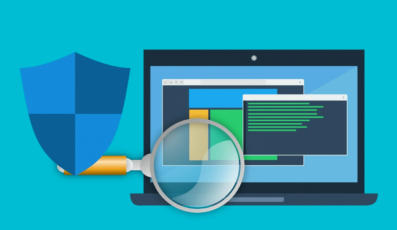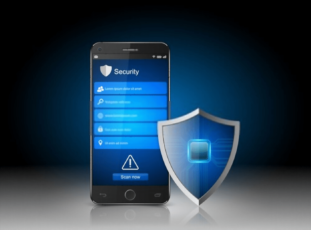Let us tell you something the antivirus software industry doesn’t want you to know: you can’t scan an iOS device for viruses. No, you can’t, honestly. You see, iPads and iPhones have a security feature known as “sandboxing.” It’s called that because it allows every app to play only within its own “sandbox.”
Everything is categorized that way, so no app on your device can change any other app, file, or process. And that’s why viruses can’t infect an iOS system. Even if they get inside, there’s nothing they can do once they’re there.
So what is the authentic meaning of a phrase like “iOS antivirus”? What it means is “internet security for iOS.” This notion refers to various features that keep iOS devices safe. That is necessary because, out-of-the-box, this hardware is not protected against many online security threats. Those include:
- Device theft
- Browser trackers
- Data-stealing apps
- Unsafe public WiFi hotspots
- Phishing links
We swept the so-called “security” iOS universe. It took us dozens of hours to go through scam apps, useless apps (free and otherwise), and security apps in the App Store that won’t do the job. We were looking for software that could deliver protection without hidden fees or fishy trial periods. Thankfully, we found five such apps – that’s the good news.
However, the so-so news is that no single free security app for iOS includes all the features you will need to keep your device safe. But, if you know your data and privacy to be worth more than a modest monthly fee, you should look at Norton’s iOS app, which is nothing short of fantastic.
This article will show you the best “antivirus” apps for your iOS devices (iPads and iPhones). These are not virus scanners but security tools that offer many valuable features to enhance your online security. These features go from protection in public WiFi hotspots to integrated VPNs. So let’s look at the best five security apps for iOS systems today.
Best iOS antivirus apps – The quick list
- Norton 360 – The market’s best security for iOS
- McAfee – Top-notch antivirus for iOS
- TotalAV – Real-time protection and VPN service
- Bitdefender – Great cybersecurity in Apple systems
- Avira – Robust and lightweight
5 best antivirus for iPhone and iPad Today – The detailed list
1. Norton 360

Nobody rivals Norton in the security software industry for reputation and antiquity. It serves more than 20 million users worldwide. And that’s no surprise since this tool works well and keeps many people safe.
Let’s have a look at Norton’s offer for iOS devices.
Norton 360 is a very active tool that protects you in several ways. For example, it will filter out spam text messages that could include phishing links. Also, it will warn you about unsafe public WiFi networks. It also patches up a variety of vulnerabilities.
The Web Protection feature will keep you away from infected websites. And there’s also the Dark Web Monitoring tool that lets you know when your personal information has been leaked.
Additionally, this app enables you to use a VPN (but only if you live in the countries where it’s available).
There is no free version, and the fee will seem a bit steep for many users. But you can take advantage of its 14-day trial version before investing money in this software.
So the price may be high for the market, but it’s the best out there, and if you take your security seriously, investing in Norton 360 merits some serious thought.
2. McAfee
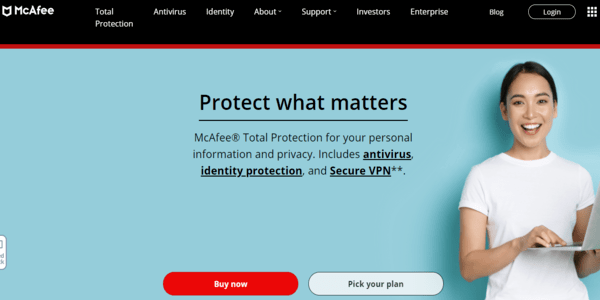
If you were searching for the best all-around antivirus app for your iPad or iPhone, congratulations, you found it. It’s McAfee. It will give you some of the most fantastic security features in the market as it keeps your device safe.
So after the glowing reviews for the first two options, how does McAffee shine? First, there’s the real-time protection feature. It will stop any incoming threats from getting inside your system. Then, it scans your system regularly to detect WiFi attacks and outdated software.
If your device is lost or stolen, McAfee will track it down and pinpoint its location using a GPS tracker and activating a remote alarm.
McAfee protects your pictures and videos with a PIN code and automatically backs up your contacts. And that’s just the free version.
If you sign up for McAfee’s Premium Plus version, you will also have at your disposal an unlimited VPN. It will secure your online activities even when you use your city’s leakiest, most surveilled Starbucks public WiFi hotspot.
You can try the Premium version for seven days before paying for a license. After that, you can cancel at any time.
3. TotalAV
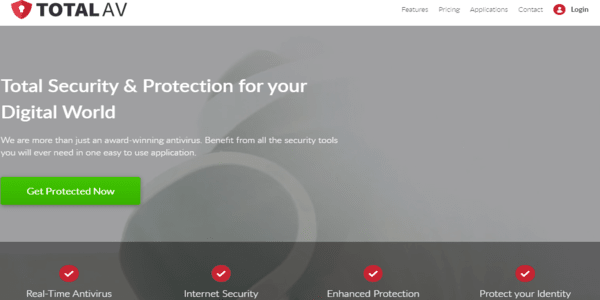
While TotalAV is not Norton360 or McAfee, it’s also at the top of iOS security and an excellent tool in terms of safety and features.
Unlike Norton360, TotalAV has a free version, and it’s surprisingly helpful. It includes a battery monitor, a photo manager, a device locator, and a data breach checker.
But most users will want to stick to the paid version as it includes two additional features called WebShield and Private Connection VPN. The first one provides real-time protection for your iOS system. The latter allows you to use a fully-fledged VPN service.
The subscription is worth the price, primarily because of the WebShield feature.
TotalAV’s ability to detect malware is excellent and will prevent threats from attacking your system. If you have noticed how dangerous the Internet has become lately, you’ll see how TotalAV is a good investment of your hard-earned money.
4. Bitdefender

Bitdefender could be the solution you’ve been looking for if you want an excellent antimalware suite for your iPhone.
This software is fantastic with virus detection, but that’s only the beginning. It’s also a complete security suite that will be the joy of many iOS users.
The iOs app sans your network connections and blocks anything that looks fishy. It includes a VPN (200 MB daily). 200 MB is not a lot of data, especially if you want to stream videos. But if you keep your online activity to browsing, it’s enough so that you won’t need to get a premium VPN account additional to Bitdefender.
It will also scan your emails for potential breaches, thus informing you about your online status.
Last but not least, the Bitdefender Central platform lets you view the status of every device under the same Bitdefender account. And you can manage the parental control settings from there as well.
Bitdefender is an excellent option, and it’s the most awarded security suite in the iOS environment, which is enough to consider it seriously.
5. Avira
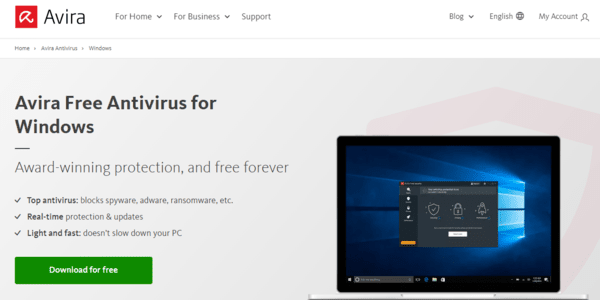
Avira has made a name for protecting Windows, macOS, and Android devices. However, it turns out that the iOS version is equally good. It’s lightweight, it’s complete, and it’s great.
Avira has an integrated VPN service that you can use along with the antimalware software –but the data is capped at 100MB daily.
But it has a lot to offer besides the VPN. For instance, it can prevent Siri from logging your Siri commands so that Apple’s servers can’t record your activities. It will also secure your connection when you’re at a public WiFi hotspot and detect other devices using your home network.
Even more, features include automatic software updates for your software, file backup, and help with recovering lost or stolen iOS devices.
But let’s not lose sight of the main thing: Avira is an excellent “antivirus” and antimalware software.
And to top it all off, it’s very cost-effective. A single Avira account lets you secure multiple devices simultaneously, so you can have it running on every phone, tablet, and computer you have.
Our methodology to select the best antivirus for iOS
Let us tell you how we tested and selected the best iOS security apps listed in this article.
The problem with most iOS antivirus apps is that they’re little more than cheaper copies of their Windows brothers and sisters, with the most exciting features stripped down and most of the functionality removed. For example, too many iOS antivirus apps won’t even include real-time protection. That’s a deal-breaker since real-time scans are antivirus software’s main point.
So we started by eliminating all the apps with no real-time protection against malware. Then we picked the apps offering the widest features for iOS users.
But quantity and quality don’t always match. The number of features is only one ingredient in this recipe, so we tried every app to ensure it had at least some authentic potential and see how smoothly it ran.
In this round, we got rid of any app that wasn’t user-friendly and glitch-free (this is software designed to run on Apple’s hardware, for Steve’s sake!).
After that, only a few apps remained. So we researched their malware detection rates and consulted tests performed by AV-Comparatives.
Once you go through all data, only a handful of apps survive. The ones in this article.
Read also: Best VPN for iPhone
Picking the best antivirus app for iPhones
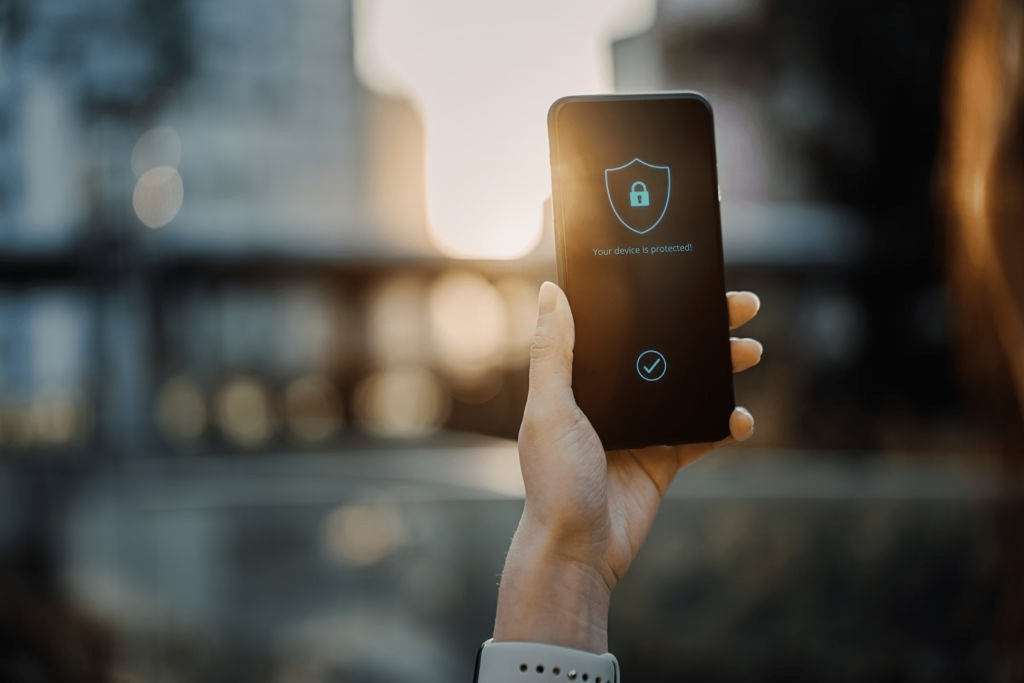
So you still can’t pick a winner? No problem. The five options are all excellent indeed. So let us offer you a few extra points to consider when selecting the best app for your iPhone.
1. Pricing
Are you ready to pay for a license or a fee? Or do you think a free app should be enough for you? Of course, the most critical single factor with pricing is that the free apps won’t give you real-time protection.
As noted before, this is an essential feature. If you can’t have it, you’ll have to trust Apple’s built-in security policies and software –and if those were so good, why would you need an app anyway?
2. Additional features
Once you’ve made up your mind about paying or not, consider the features. For example, are you interested in file backups, data breach checkers, device locators, or VPNs? The VPN is always a good thing to have, in my opinion (but it’s also always better to have a premium VPN service like NordVPN), but maybe having your pictures protected doesn’t seem like that big a deal for you. So see which app fits you best.
3. Data privacy
Some free antivirus apps can harm your privacy as they log user data. Some paid apps may also do the same, but they are a few only. So before choosing one, make sure that your antivirus provider does not log or sell user data and doesn’t meddle with your privacy.
4. Multi-device support
Last but not least, consider all your other hardware. Yes, we’re talking about iOS devices primarily here. Still, since these antivirus suites offer coverage for multiple devices for a single account, you should consider which provider will be more helpful if you have one or more computers running on Windows, for example.
Every option in our top five list also offers excellent antivirus protection for Windows (so you have other choices except Windows Defender now, too), Android, and macOS, so if you take that into account from the beginning, you will save yourself a bit of work and money down the line.
Installing an antivirus on an iOS system
We’re talking about Apple systems, so the installation process is quick and painless. Just follow these steps:
- Open the App Store. Search for the app you want.
- Download the app onto your device. Open it.
- Accept the app’s license agreement, privacy notice, and terms of use.
- If you have an existing account, log into it. Otherwise, create a new account.
- Finish the app’s setup by following the instructions.
Do I need an antivirus security app on my iPhone and other iOS devices?
Yes, you do need one, indeed. Granted, you probably need an antivirus app much less on iOS devices than on Windows or Android, but you will still need it sooner or later.
The information available on this subject is contradictory and all over the place. So, if you run a google search for “Do I need antivirus software in my iPhone?” you will find every possible answer under the sun.
Many websites swear that iOS devices can’t possibly ever get a virus, so any antivirus tool you can buy or install is a waste of your time, money, and hardware resources. However, on the other side of the spectrum, some websites try to scare you badly enough to download and install an antivirus immediately.
As it often happens in the digital world, the truth is never in the extremes.
Granted, the iOS sandbox architecture makes it almost impossible for any virus to do any damage. But that cannot guarantee that you will never face a potentially harmful security threat.
Also, have you “jailbroken” your Apple hardware? If you have, you neutralize Apple’s security policies and mechanisms, so your iPhone or iPad is prone to get a virus. Why? You did away with the software restrictions imposed by Apple. Those are the very restrictions that previously protected your system from virus infections.
Another threat comes from malware-infested web pages or malvertising. They’re all over the Internet, and you can browse one of them. Even if you use search hits from the Safari search engine, you could end up in one of those — no, not even the famously controlled Safari is 100% safe.
So yes, getting a virus in an iPhone is much rarer than in a Windows or an Android device. But you could still have it happen to you, and if you take no precautions, you’ll make it more likely.
Are there any free antivirus apps for iOS?
Yes, there are many. In fact, all the options listed in this article have a free version, except for Norton360. So, you can easily use one for free to test the app’s feasibility before paying for a subscription.
However, using a free antivirus is something we can’t recommend because of the inherent feature limitations. For example, you’ll often find them lacking real-time protection, which is much-needed even on iOS devices, if not critical. Since you can’t predict how malware can reach you, it’s better to secure your iPhone or iPad with a robust paid antivirus and keep your worries aside.
Besides, free antivirus apps, especially the free versions of otherwise premium tools, lack or limit the availability of additional features. That means if you choose a VPN to avail of the other VPN, password management, and device optimization benefits, you won’t get them all without paying.
So, simply put, while you can always find a free iPhone antivirus online, you should ideally avoid them.
Top antivirus apps that didn’t make the cut
There are other good options in the App Store, but they’re not as good as the five options we picked. Let us tell you which ones and why.
- Lookout: It’s an excellent iOS-specific app. It includes advanced anti-theft features, anti-phishing measures, and identity theft monitoring. So there is nothing wrong with Lookout for sure. But everything it does is available from the other five choices and with better value.
- Phone Guardian: This app is a free VPN that will also encrypt your pictures and personal data. It’s good, as free apps go. But nowhere near as sophisticated and helpful as the elements in my list.
- Avast: It works. But it was also caught in a scandal because it sold its users’ data to big corporations. That’s not what you want from the software charged with keeping your online privacy safe.
Conclusion
The Apple iOS ecosystem is a bit different from Windows or Android. But, for the most part, Apple is already aware of the most common threats to an iOS system in terms of viruses and malware, and it has you covered.
Consequently, high virus detection rates in iOS antivirus apps are not the critical element they can be in, say, Windows. So the best antivirus providers for Apple mobile systems need to give you value in their service by offering extra stuff.
So the best iOS antivirus apps offer many features, and you need to consider them if you choose wisely. How compatible any given app is with other operating systems or platforms also comes into play.
As the proud owner of an iPhone or an iPad, you could get overconfident because Apple’s reputation for security is outstanding in the industry — although some would say it’s overblown.
But it would be best if you took no risks. Do not forget this: all you need to have your life turned upside down is a single virus. Don’t let that happen. Instead, consider any of the five options in this list.
FAQs
Yes, it can. Downloading infected apps or files is not the only security threat you will face online. Websites can be dangerous too. That’s why real-time protection on your iPhone or iPad is a good idea.
If there’s an infection on your iPhone or iPad, you’ll notice it in several ways. Unusual battery drainage would be a warning sign. Also, you need to know if your device is jailbroken (more important, if you bought a used device). And if you notice an app that’s there, that you don’t remember installing yourself, and that wasn’t there from the beginning, your phone could be infected.
Yes. Your iOS includes several excellent security measures, but you can’t configure them or deal with them independently as if they were a separate app.
It depends. The answer is affirmative in most scenarios, but you shouldn’t just assume that it will. Check the product’s specifications to know if it will give you the features you expect. Remember that some key features could work exclusively on iPhones even if the app works on the iPad.
As explained initially, viruses are not the worst threat that should worry you. Many other types of online threats can harm you, and you should consider them seriously. An essential feature is real-time protection. It has the disadvantage that you need to pay for it, but it’s critical for your security. Other than that, each security suite offers you a set of similar features. At this point, once you have secured real-time scans, the rest is all about your personal preference. Choose the option that fits better with your digital lifestyle.
No, a good one shouldn’t affect your battery’s charge very much. A virus or a piece of malware, on the other hand, will drain your battery life very quickly indeed.
Not really. But it doesn’t bar you from using an iPhone antivirus, either. Apple boasts top-notch security and privacy on iOS devices, so it doesn’t need to recommend using an antimalware or antivirus app on your iPhone. But you never know how malware may infect your iPhone too. Numerous reports have surfaced online regarding hacking and spying on iPhones. Therefore, it’s better to keep your iPhone secured with an antivirus, regardless of whether Apple recommends using one.
